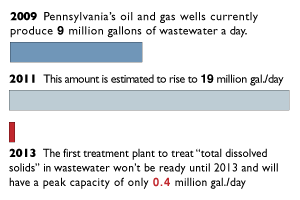Propublica reports on a neighboring state's slow realization that handing out natural-gas drilling permits like candy is having serious consequences:
Workers at a steel mill and a power plant were the first to notice something strange about the Monongahela River last summer. The water that U.S. Steel and Allegheny Energy used to power their plants contained so much salty sediment that it was corroding their machinery. Nearby residents saw something odd, too. Dishwashers were malfunctioning, and plates were coming out with spots that couldn’t easily be rinsed off. Pennsylvania’s Department of Environmental Protection soon identified the likely cause and came up with a quick fix. The Monongahela, a drinking water source for 350,000 people, had apparently been contaminated by chemically tainted wastewater from the state’s growing natural gas industry. So the DEP reduced the amount of drilling wastewater that was being discharged into the river and unlocked dams upstream to dilute the contamination.But questions raised by the incident on the Monongahela haven’t gone away.
In August, contamination levels in the river spiked again, and the DEP still doesn’t know exactly why. And this month the DEP began investigating whether drilling wastewater contributed to the death of 10,000 fish on a 33-mile stretch of Dunkard Creek, which winds through West Virginia and feeds into the Monongahela. A spate of other water contamination problems have also been linked to gas drilling in Pennsylvania, including methane leaks that have affected drinking water in at least seven counties.
Read the whole thing — the problems go far beyond dirty dishes. Ohio should watch Pennsylvania closely; our neighbor to the east "is at the forefront of the nation’s gas drilling boom, with at least 4,000 new oil and gas wells drilled here last year alone, more than in any other state except Texas." But all that means is that Pennsylvania is learning more quickly that it's not remotely prepared to deal with the unintended consequences of ever more aggressive drilling. Why should we believe it will be different here? — Frank Lewis


